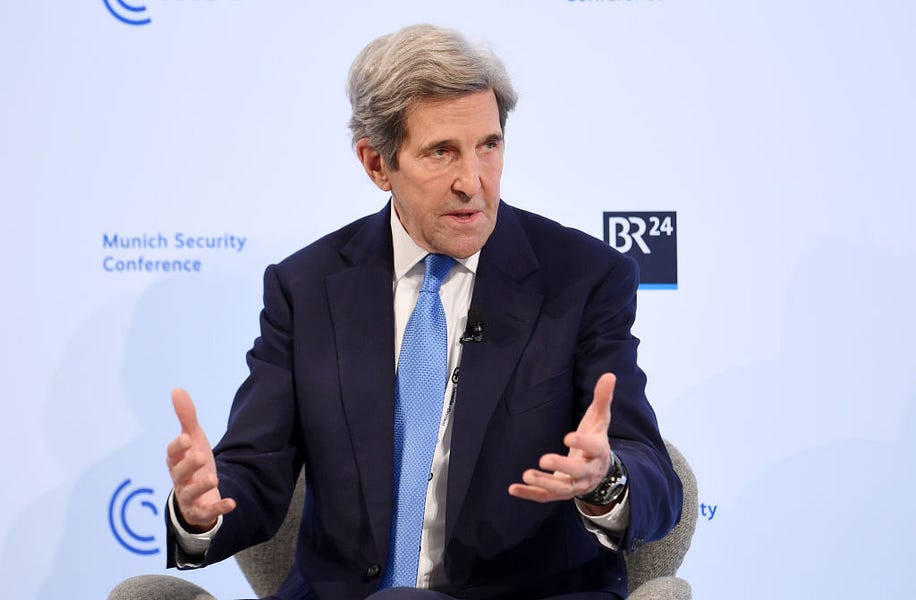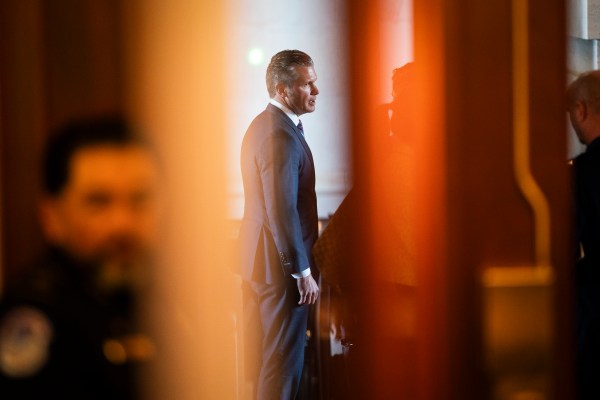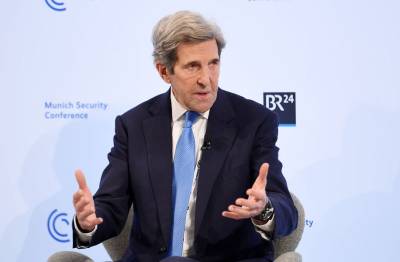A rare moment of bipartisanship broke out last week when House Speaker Nancy Pelosi and South Carolina GOP Sen. Lindsey Graham agreed that the United States should ban energy imports from Russia. The unlikely alliance prompted Graham to quip that Putin had “done something nobody else could do.”
Graham joined Sens. Joe Manchin (D-West Virginia) and Lisa Murkowski (R-Alaska) as a cosponsor of their bipartisan “Ban Russian Energy Imports Act” that would prohibit Russian fossil fuel imports. Manchin argued the U.S. was “emboldening Putin” by buying more than 500,000 barrels of oil per day from Russia while Murkowski said the bill would make sure “Americans aren’t forced to help finance” Russia’s aggression and atrocities.
The Biden administration, however, isn’t convinced. White House press secretary Jen Psaki said, “We don't have a strategic interest in reducing the global supply of energy and that would raise prices at the gas pump for the American people. … It’s as simple as less supply raises prices, and that is certainly a big factor for the president at this moment. It also has the potential to pad the pockets of President Putin, which is exactly what we are not trying to do.”
One “simple” point Psaki left out is that the U.S. can affect supply (and gas prices) by producing more at home. In 2019, the U.S. became a net oil and gas exporter when our production hit nearly 13 million barrels a day. In 2020, the U.S. was still the No. 1 oil producer in the world at 11.3 million barrels a day (15 percent of global production) while Russia was No. 2 at 9.9 million barrels a day (13 percent of global production). Had the Keystone XL pipeline moved ahead as planned and we banned Russian imports, we would still have about 300,000 barrels of oil leftover per day.
Another key point of context, which isn’t especially helpful to either side, is that Russia accounts for just 7.9 percent of our oil imports. Canada provides 51.3 percent while Mexico provides 8.4 percent. By increasing domestic production, we can set ourselves on a path to more than offset the oil we’d lose by not buying from Russia. However, increasing domestic production can’t displace Russia’s total output and we can’t stop Russia from selling oil to other countries such as China.
Today, it’s only somewhat true that Russia is a “gas station masquerading as a country,” as the late Sen. John McCain famously said in 2014. The remark got under Putin’s skin, and he took steps to diversify Russia’s economy. In 2020, Putin told reporters, “[W]hile we’re not completely there, we are nonetheless starting to get off the so-called oil and gas needle. If someone still wants to consider us as a gas station, then this has no real basis.”
Russia’s energy sector now accounts for about 25 percent of its GDP, which is not insignificant. A more balanced view may be that Putin’s Russia is a convenience store owned by oligarchs that sells gas.
The bottom line for American policymakers is that while America alone can’t impoverish Putin, we can tell him we aren’t financing his atrocities. That alone is a message worth sending. The Biden administration is right that high energy prices embolden Putin (he reaped a windfall in 2021) but they’re wrong to oppose increased domestic production, which can lower energy prices.
For Republicans, banning imports of Russian oil and doing everything possible to ramp up supply at home are no-brainers. Expect candidates, including some Democrats, to hammer both themes until Biden relents. Yet, conservatives have an opportunity to offer something more ambitious and transformative than “Drill, Baby, Drill” 2.0. We can reshape the climate debate and redefine what it means to be serious about environmental stewardship for decades to come.
To do that we need to pick up the phone. The 1980s are calling again.
Conservatives Used to Play Offense on the Environment
On December 12, 1983, Reagan’s National Security Council argued in a now-declassified memo that environmental issues were an opportunity for our government – and the free world – to promote private sector innovation and undermine confidence in authoritarian command-and-control states. The NSC argued:
“Emphasis should be placed on the potential of science and technology for remedying the environmental disruptions of modern industrial society … The considerable successes of the USG [United States Government] and American industry in environmental protection should be contrasted with the sorry record of the Soviet Union.”
In 1986, following the Chernobyl disaster, the NSC argued that environmental issues presented an important opportunity to mobilize dissident groups and overthrow oppressive regimes.
Environmental issues, especially after the Chernobyl accident, provide fertile ground for dissident activity … These groups do offer alternative solutions to a growing number of economic, social, and environmental problems; as the societies become increasingly alienated from their rulers, they may be quicker to seize on issues that could be embarrassing to the regimes … younger party leaders may soon develop a better understanding of the grievances expressed by the opposition, and these issues may prove divisive within the regimes as the next generation comes to power.
This memo comes from the files of Walter Raymond, who served on the NSC and ran public diplomacy and “Project Truth” for Reagan. I worked with Raymond on a democracy-building project in the former Yugoslavia in 1999. Raymond was also keenly interested in promoting democracy in Ukraine to build a bulwark against the very aggression we’re seeing today.
These memos show that Reagan instinctively believed in the capacity of free societies to innovate and self-correct. Almost 40 years of subsequent data supports Reagan’s conviction. In his 2021 paper, “Free Economies are Clean Economies,” Nick Loris, the vice president of public policy at C3 Solutions (which I helped found), established the strong correlation between economic freedom—low taxes, low spending, less regulation, the rule of law, property rights, free trade—and environmental performance. Loris found that free economies are twice as clean as less free economies.
Another key conservative from the 1980s, British Prime Minister Margaret Thatcher, gave conservatives a way forward on climate. In 1988, the Iron Lady said, “For generations, we have assumed that the efforts of mankind would leave the fundamental equilibrium of the world's systems and atmosphere stable. But it is possible that with all these enormous changes (population, agricultural, use of fossil fuels) concentrated into such a short period of time, we have unwittingly begun a massive experiment with the system of this planet itself.”
Some argue that Thatcher recanted her previous statements later in life, but she may have been primarily reacting to an environmental movement that had become dogmatic, unscientific about science, and had come to view the climate debate as a staging area for a proxy war against capitalism. Thatcher rightly blasted subsequent efforts to tackle climate change as a “marvelous excuse for worldwide, supra-national socialism.”
Yet, Reagan and Thatcher’s initial instincts were right and have been vindicated by decades of advances in economics and political and natural science. Their way of thinking provides a strategic roadmap for conservatives in 2022. Conservatives in the U.S. and abroad are increasingly picking up this mantle. At the Climate and Freedom Symposium during COP26, Dr. Liam Fox, a member of the British Parliament and former secretary of defense, said, “[O]ur choice will be between the de-growth agenda of the left, constantly telling us what must be forbidden in our private and public lives, or one of innovation, creativity and technological advance.”
Progressive Climate Fundamentalism Is in Retreat
Conservatives are reluctant to be open about their stewardship convictions because they view climate change as a pseudo-religious topic. They aren’t wrong to feel this way. The Swiss psychologist Carl Jung, who argued that all people have a “religious instinct,” said in 1961 that the new Communist regimes didn’t kill God; they just replaced God with other gods (i.e. the state and dictators). The same is true today. Even with the rise of the “nones” – the religiously unaffiliated – people in 2022 aren’t necessarily less religious; they’re just religious about other things, including climate change as well as flawed political figures.
Because of the rise of progressive climate fundamentalism in Europe, our organization was among the many voices warning that Europe’s reliance on Russian natural gas was increasing the chances of armed conflict. Europe was importing 40 percent of its natural gas from Russia, with economic powerhouse Germany was importing 63 percent.
Germany, in particular, had been captured by climate fundamentalists who require a visceral, dogmatic, and unwavering condemnation of zero-emission nuclear energy and dirty fossil fuels (even though fossil fuels have lifted hundreds of millions of people out of poverty in the past century). German politicians, and politicians throughout Europe, played a cynical shell game with climate activists. They used Enron-style energy accounting to stay “green” while shifting emissions to Russia. In so doing, Europe had taken a powerful hammer in its toolbox—energy security—and handed it to Putin.
Yet, just 72 hours after Putin’s invasion, something remarkable happened. Germany had a “Road to Kyiv” conversion experience and unequivocally embraced pragmatism over climate fundamentalism. In a watershed speech, German Chancellor Olaf Scholz said his country was determined to stand on the “right side of history.” Scholz announced Germany would cease construction on the vital Nord Stream 2 gas pipeline, kick Russia off the SWIFT banking system, and deliver 1,000 anti-tank weapons and 500 Stinger anti-aircraft missiles, reversing Germany’s longstanding policy of not providing lethal military aid. Scholz also said he would buy new natural gas terminals and utilize coal while still pursuing zero emission goals. Reagan and Thatcher would have been proud.
While Germany and much of Europe is putting itself on the right side of history, the Biden administration and its climate czar, John Kerry, seem content to be on the wrong side of history. As Putin launched his barbaric assault on Ukraine, Kerry lamented the distraction to the climate debate saying, “I hope President Putin will help us to stay on track with respect to what we need to do for the climate.” Putin’s actions, however, suggest that leaders who drop cluster munitions aren’t interested in carbon emissions.
International security experts, including President Trump’s Department of Defense have long warned that climate change is a “threat multiplier” that can increase the odds of armed conflict. With Ukraine, the threat multiplier has arrived and is evolving in real time. Climate change didn’t cause Putin to invade Ukraine but bad climate policy and the West’s willingness to engage in economic self-harm and virtue signaling was certainly a factor that tilted the scales in Putin’s warped mind. In fact, Putin’s decision to put his nuclear forces on high alert and Russia’s attack on the Zaporizhzhia nuclear plant—the largest plant in Europe—demonstrate that bad climate policy has arguably done more to put humanity at risk than climate change itself.
Kerry’s aloofness and tone-deafness betrays a movement that has become an arrogant, complacent, and incompetent monopoly. In the marketplace of ideas and products, monopolies inevitably lose self-awareness and produce crappy products. The climate fundamentalists seem to believe the public will buy their policy dog food and dystopian Soylent Green New Deal because it’s the only thing on the shelf. Conservatives should urgently respond by working with people of good faith and common sense in the Biden administration and Congress to put superior products on the shelf.
Banning Russian oil and increasing domestic production are merely first steps. Loris has outlined five specific steps including:
Expedited permitting for energy projects and infrastructure, including but not limited to liquid natural gas (LNG) export terminals, renewable power, transmission lines, and electric vehicle charging stations. The UNSHACKLE Act sponsored by Sen. Mike Lee (R-Utah) and Rep. Liz Cheney (R-Wyoming) and the BUILDER Act sponsored by Repr. Garret Graves (R-Louisiana) are two bills that would dramatically improve the permitting process.
Fast-track permitting for LNG exports. If the U.S. does not have a free trade agreement (FTA) with the country receiving or sending the natural gas, the Department of Energy must make a public interest determination. The reality is LNG exports benefit Americans economically and geopolitically and private companies should be able to sell natural gas to any buyer they want, so long as it does not compromise national security. The ESCAPE Act would accomplish a similar objective.
Provide alternative pathways to site and permit LNG facilities to remove bottlenecks.
Eliminate steel and aluminum tariffs, which drive up the cost of energy infrastructure.
Expand U.S.-EU partnership on small modular reactors (SMRs) to help Europe achieve its energy security and climate objectives.
Other long-term solutions like Rep. Bruce Westerman’s (R-Arkansas) Trillion Trees Act should be top priorities. And if Congress wants to get really serious about climate solutions, it should recycle government waste instead of creating more. Redirecting additional funds to basic research and development through offsets would tilt the scales in favor of the innovation Reagan celebrated and saw as a tool to defeat authoritarianism 40 years ago.
Biden had an opportunity to hit reset during his State of the Union speech. Instead, he hit retread. Yet, his seasoned team knows it’s never too late to start over. He has many potential partners among Republicans and centrist Democrats if he chooses to follow Germany’s lead by prioritizing pragmatism over climate fundamentalism.
If Putin thinks his abhorrent actions and war crimes will divide and splinter the West, he is mistaken. The world is uniting behind Ukraine. Our principled pluralism and open debates reveal our strength and expose his weakness. By standing together the West can also put the Chinese Communist Party on notice that we intend to speak directly to the next generation of Chinese who deserve self-determination and a future free of authoritarianism and concentration camps. It’s long past time that we create more problems for the CCP than they create for us and climate is a topic that will help our cause.
This was Reagan’s model. In 1988, Reagan traveled to the Soviet Union to speak directly to Soviet dissidents in Moscow. In hindsight, the fall of communism seemed inevitable but then it was not. The future was full of uncertainty and danger. Reagan was resolute, fearless and graceful. He said, “I came here hoping to do what I could to give you strength. Yet I already know it is you who have strengthened me … While we press for human rights through diplomatic channels, you press with your very lives, day in, day out, year after year, risking your jobs, your homes, your all.”
Today, Ukraine’s leaders and citizens are strengthening us. They deserve nothing less than our very best, which means serious, long-term and durable bipartisan solutions that eschew short-term political opportunism.
John Hart is the co-founder of the Conservative Coalition for Climate Solutions.






Please note that we at The Dispatch hold ourselves, our work, and our commenters to a higher standard than other places on the internet. We welcome comments that foster genuine debate or discussion—including comments critical of us or our work—but responses that include ad hominem attacks on fellow Dispatch members or are intended to stoke fear and anger may be moderated.
With your membership, you only have the ability to comment on The Morning Dispatch articles. Consider upgrading to join the conversation everywhere.